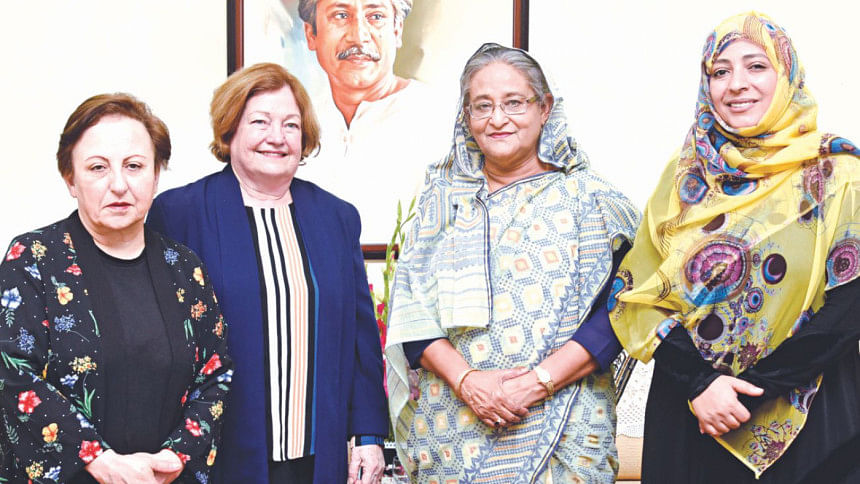Refer Rohingya genocide to ICC

The three female Nobel Peace laureates have urged Bangladesh, the UN and other state parties to refer Myanmar military and other perpetrators to the International Criminal Court for the “genocide” against the Rohingyas.
“Alternatively, the ICC prosecutor should open an independent investigation into the crimes against humanity and genocide perpetrated in Rakhine state,” they said in a statement following their three-day visit to the refugee camps in Cox's Bazar.
“If today we turn a blind eye to the genocide against the Rohingya people, be sure that in the future there will be many similar acts of genocide against the Muslims,” Nobel Peace Prize winner from Iran Shirin Ebadi said at a press conference in the city's Pan Pacific Sonargaon hotel yesterday.
Tawakkol Karman of Yemen, Mairead Maguire of Northern Ireland and Shirin Ebadi -- who all played revolutionary roles in establishing human rights in their native countries and beyond -- visited the Rohingya camps and other refugees living in the no-man's land near Bandarban's Ghundhum to assess the crisis on the ground.
During the visit organised by the Nobel Women's Initiative, a platform of six Nobel Peace laureates, and Bangladesh's women rights organisation Naripokkho, the trio talked to over 100 Rohingya women and children.
“All the women we met were raped. Most of the children that we met fled to Bangladesh without families. Their fathers and mothers were killed and their villages burnt,” Tawakkol Karman said at the press conference.
The Myanmar soldiers raped women in front of their children and husbands, while babies were thrown to the fire, she said, adding that the violent acts by the Myanmar army were “nothing but genocide”.

“How can we remain silent in front of all these crimes? We are in the 21st century. We should stop all these crimes…killings, hatred, racism,” Tawakkol Karman told journalists.
Nearly 700,000 Rohingyas have fled atrocities in Myanmar and entered Bangladesh since late August last year, creating the world's fastest growing refugee crisis. The UN discussed the crisis several times since September, but could take no concrete action to address it due to objections from China and Russia.
Although a repatriation deal was signed between Myanmar and Bangladesh late November last year, Rohingyas are still coming to Bangladesh, prompting stronger calls for referring Myanmar to the ICC.
Shirin Ebadi, an eminent legal expert, said Myanmar was not a state party to the Rome Statute establishing the ICC. The UN Security Council can recognise Myanmar's crimes against humanity and then refer it to the ICC, she said.
“We want this case to be discussed at the UN Security Council and there is sufficient evidence for this to take place,” she said.
However, China and Russia, which have veto powers as members of the Security Council, are likely to use the powers because of their interests in Myanmar, the Nobel laureate said.
She also said the solution, therefore, lies in creating world public opinion against the “genocide” being committed by the Myanmar authorities for long.
She said though China had economic interests in Sudan but thanks to journalists, the crimes against humanity in the African country created a huge public opinion worldwide, and then the UN Security Council referred Sudan to the ICC in 2005 for genocide.
“What is more important is that public opinion at an international level. It could actually force these states to think about humanitarian aspects,” Shirin Ebadi said.
Contacted, Mizanur Rahman, a law professor at Dhaka University, said the “Rohingya issue lost its momentum due to Myanmar's signing of a bilateral repatriation deal with Bangladesh”.
“It was a trap by Myanmar, and Bangladesh fell into it,” he said. The legal expert, however, agreed with the Nobel laureates about creating world opinion to take Myanmar to the ICC.
“These Nobel Laureates are important voices in the global civil society. Now that they are raising their voice, Bangladesh should join them to create public opinion globally against Myanmar's genocide,” Mizanur said.
The Nobel laureates said the repatriation of the Rohingyas must be voluntary and safe and they should be granted citizenship in Myanmar.
“The Myanmar government should take immediate action to address the systematic discrimination of the Rohingyas in Rakhine and ensure their rights to nationality, land ownership, freedom of movement and other fundamental rights,” they said in the statement.
Since 2007, China backed by Russia, has foiled several efforts by the UN Security Council on Myanmar with their veto powers.
The International Human Rights Clinic of the Harvard Law School in a report in 2009 said Myanmar perpetrated four types of crimes: forced displacement of population, sexual violence, murder and tortures.
Based on that, five jurists called on the UN Security Council to urgently establish a commission of inquiry to probe and report on crimes against humanity and war crimes in Myanmar.
Yale University documented atrocities by the Myanmar military against the Rohingya that increased since 2012 and provided available evidence having all the elements of genocide in Rakhine, where Rohingyas are denied of citizenship and other basic rights including healthcare and right to movement.
The UN, however, could take no effective actions against Myanmar.
The three Nobel laureates have promised the Rohingyas that they would raise voice globally and fight to pursue justice on their behalf.
They also demanded a comprehensive arms embargo on Myanmar and an increase in the international community's support to Bangladesh's humanitarian response.
Bangladesh should ratify the 1951 Geneva Refugee Convention, as a major step to give protection to refugees and set an example in South Asia, they said in the statement.
PLAN TO VISIT MYANMAR
The Nobel laureates said they had appealed to their fellow laureate Myanmar's de facto leader Aung San Suu Kyi several times to speak out and stop the “genocide”, but they received no response to it.
Tawakkol Karman said they would now ask Suu Kyi to grant them visa so they can visit the Rohingya land, speak with her and convince that she was responsible (for the 'genocide').
“You take action or resign,” she said, asking Suu Kyi.
Shirin Ebadi said Suu Kyi was directly responsible for the “genocide” as she took no step to stop the atrocities in Rakhine.
“I am sorry to say that Aung San Suu Kyi has turned a blind eye to the crimes against Rohingya in her country,” she said.
Mairead Maguire said it was important to spread the message of non-violence, path of dialogue and teachings of peace worldwide.
“We need to stand and speak the truth. We need to unite our voice together and create new consciousness that will be a global human family that can solve problems,” she said.
Nobel Women's Initiative Executive Director Liz Bernstein and Shireen Huq of Naripokkho also spoke at the press conference.

 For all latest news, follow The Daily Star's Google News channel.
For all latest news, follow The Daily Star's Google News channel. 








Comments